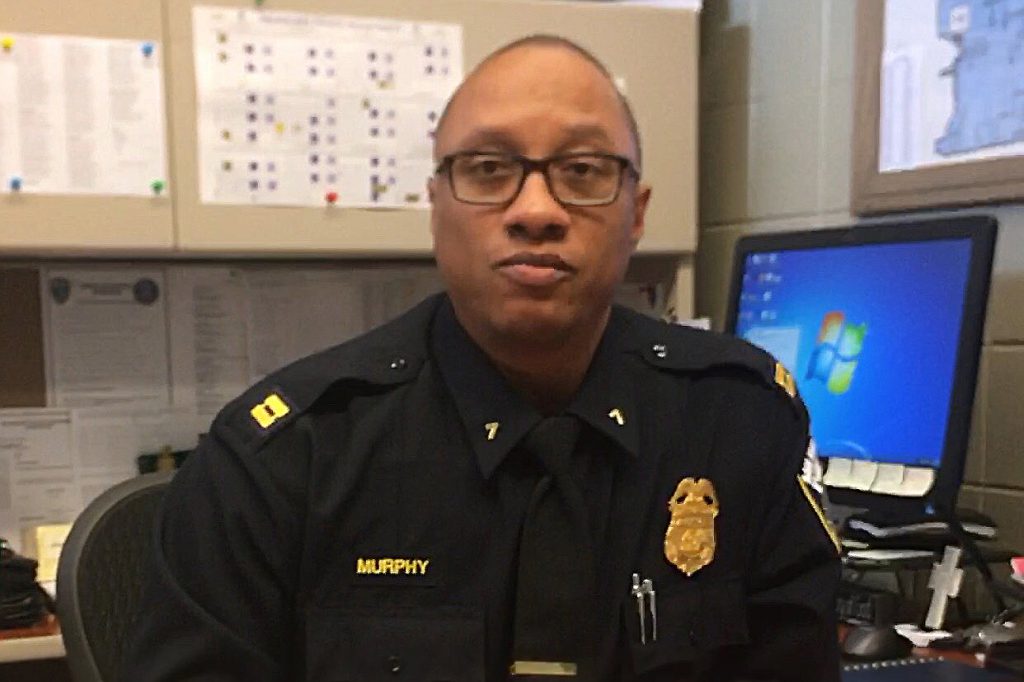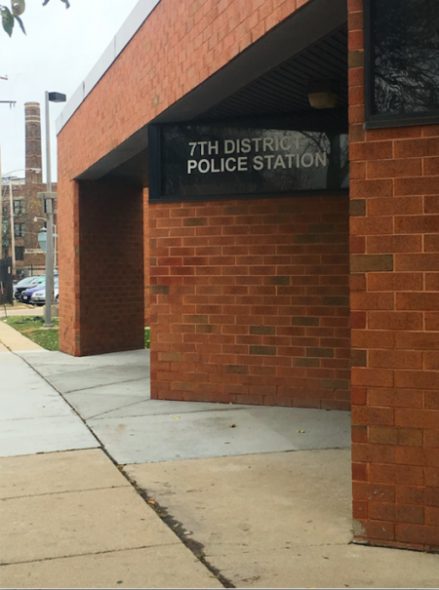Police Relations in Sherman Park Still An Issue
Capt. Willie Murphy of District 7 is working to rebuild trust in the neighborhood.

Willie Murphy has been captain of Milwaukee Police Department District 7 since June. Photo by Areonna Dowdy/NNS.
Although it has been more than two years since Sylville Smith was shot to death by a Milwaukee police officer, leading to violent protests, the shooting continues to affect the relationship between law enforcement and residents, according to Camille Mays, community organizer at the Sherman Park Community Association.
The shooting caused a lack of trust between the community and police officers, said Mays.
Capt. Willie Murphy of the Milwaukee Police Department’s District 7, which includes Sherman Park, said he hopes to change that.
“I want to help repair the Sherman Park community because as a police captain it is a priority to serve and protect as well as being a leader to model the right way to do things,” said Murphy, who has been in his role since June.
Murphy grew up in Milwaukee’s central city near Palmer and Burleigh and has seen many interactions between the police and community residents. He said he sees a difference in policing compared to when he grew up.
“When I grew up, the police never had problems with the youth or residents in my community. Now that I am a captain in a different neighborhood, I see that it can be a challenge to deal with youth,” said Murphy. “Some come from homes that are economically depressed and homes that are broken.”
Murphy is working to rebuild the trust in the community with a special emphasis on youth.
“I plan to go into the community with my officers to get to know the residents. I want to keep officers in their assigned areas, so the residents and officers can become familiar with each other and the problems that go on in the community,” he said.
According to Mays, relations between community members and police need tremendous improvement. She said that she has not seen any improvement since the Smith shooting, but has faith that will change with Murphy as the captain.
Mays praised the community liaison officers in District 7, saying that they are models for the behaviors and activities that should be standard for all police officers. Community liaison officers work for the Milwaukee Police Department to help address issues such as drugs, violence and theft, along with police officers and department leaders.
“Community liaisons are important to the community because they are the link between the residents of a particular community and the police,” said Steve O’Connell, director of block watches for District 7. “Just like community liaisons establish relationships, the police have to be willing to do the same in order to improve community and residents’ relationships.”
Reggie Moore, director of violence prevention for the City of Milwaukee, said that police should center their efforts around the Milwaukee Blueprint for Peace. The blueprint is organized around six broad goals: stop the shooting; promote healing and restorative justice; support children; youth and families; promote economic opportunity; foster safe and strong neighborhoods; and strengthen the coordination of violence prevention efforts.
“Looking at these goals will help the police …look at violence from a public health perspective,” Moore said.
Noted Mays, “What is vital to better relationships is more police who understand cultural issues and systematic social disparities.” She added that the city residency requirement should be reinstated.
In 2013, the state legislature invalidated the city’s 75-year-old residency requirement. Law enforcement officers, firefighters and designated emergency personnel still need to reside within 15 miles of the city’s boundaries.
In addition, before officers work in a particular neighborhood, Mays said, they should attend events where community members are doing positive activities, so they have a better understanding of the neighborhood.
This story was originally published by Milwaukee Neighborhood News Service, where you can find other stories reporting on eighteen city neighborhoods in Milwaukee.
More about the Sherman Park Unrest
- Plea Agreement Reached On Long-Pending Sherman Park Unrest Charges Involving Vaun Mayes - Jeramey Jannene - Oct 17th, 2024
- City Attorney OKs $4 Million Settlement with Sylville Smith Family - Madeline Fox - Oct 23rd, 2020
- Sherman Park Still “Warm and Welcoming” - Andrea Waxman - Aug 16th, 2019
- Police-Community Relations Better in Sherman Park? - Edgar Mendez - Aug 14th, 2019
- Three Years Later, Sherman Park Rising? - Allison Dikanovic - Aug 13th, 2019
- Eyes on Milwaukee: A Sherman Park Success Story - Jeramey Jannene - Jul 23rd, 2019
- Eyes on Milwaukee: Incubator Kitchen Planned for Sherman Park - Jeramey Jannene - Jul 1st, 2019
- Questions Surround Vaun Mayes’ Arrest - Isiah Holmes - Feb 6th, 2019
- Police Relations in Sherman Park Still An Issue - Areonna Dowdy - Jan 7th, 2019
- Can Sherman Park Attract More Business? - Ximena Conde - Sep 13th, 2018
Read more about Sherman Park Unrest here






















Rebuilding trust in the community is the heart and soul of the ACLU Settlement Agreement and Court Order https://www.aclu.org/legal-document/settlement-agreement-executed-parties.
The plaintiffs alleged that there were hundreds of thousands of cases where the MPD, stopped, frisked and searched people without documenting their reasonable suspicion for doing so (per MPD Inspector Terence Gordon, the approximate number was contested by the MPD). The Court Order mandates that the MPD capture demographic data for all traffic stops and field interviews including a narrative of the reasonable suspicion for the stop. The Settlement Agreement requires updates to Standard Operation Procedure 001–Fair and Impartial Policing and Standard Operating Procedure 085–Citizen Contacts, Field Interviews, Search and Seizure. All officers and supervisors will be required to go through training to implement this. Please note that SOP 085 was supposed to have been approved by the FPC by October 23, 2018 but it has not been reviewed by them as of yet.
The plaintiffs in the ACLU lawsuit alleged that:
“Plaintiffs allege that Defendants’ policies, practices, and customs related to stops and frisks by the Milwaukee Police Department (“MPD”) violate the United States Constitution by: (1) authorizing MPD officers to stop people without individualized, objective, and articulable reasonable suspicion of criminal conduct, in violation of the Fourth Amendment to the U.S. Constitution; (2) authorizing MPD officers to frisk people without individualized, objective, and articulable reasonable suspicion that the person is armed and dangerous, in violation of the Fourth Amendment to the U.S. Constitution; and (3) sustaining stops and frisks of Black and Latino people that involve racial and ethnic profiling, or are otherwise motivated by race and ethnicity, rather than reasonable suspicion of criminal conduct, in violation of the Fourteenth Amendment to the U.S. Constitution and Title VI of the Civil Rights Act of 1964, 42 U.S. § 2000d et seq. (“Title VI”).”
*** Please note that the Defendants (FPC, MPD and City of Milwaukee) denied these allegations ***
In my conversations with members of the Fire and Police Commission and the Milwaukee Police Department, they have pointed out that the ACLU Settlement Agreement is not a Consent Decree—it is a Court Order. And what is the difference?
https://www.legalbites.in/difference-decree-order/
“A decree is an adjudication which conclusively determines the rights of the parties with regard to any or all matters in controversy. On the other hand, an order may or may not finally determine the rights of the parties.”
Thus they are in effect claiming, ‘we didn’t do anything wrong, we didn’t violate anyone’s rights, but we will abide by the Court Order and properly document our grounds for reasonable suspicion going forward’.
Whether it is called a Consent decree or a Court Order and whether or not the City, FPC and MPD admit they did anything wrong or not, the fact is that trust between them and the people of this City, especially black men, has been seriously damaged.
I hope that everyone interested in restoring trust between the MPD and the people will attend as many MPD District Crime and Safety Meetings as possible and request updates for how the changes mandated by the ACLU Settlement Agreement and Court Order are being implemented by the MPD. The bottom line is the racially biased policing behaviors have to stop and stay stopped for the rift between the people and the FPC, the MPD and City of Milwaukee to heal.